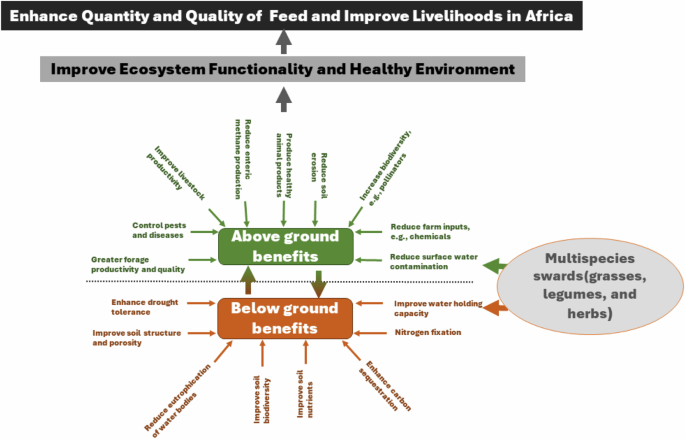Despite the numerous benefits of multispecies swards, there are challenges to their adoption and implementation in Africa. One of the primary challenges is the lack of knowledge and technical expertise for the selection and evaluation of multispecies sward forage mixtures of tropical-origin species generally. While there is a substantial body of evidence regarding the benefits of multispecies swards to help address many societal concerns regarding the sustainability of livestock production systems in temperate regions, there is a paucity of information regarding their benefits in Africa. Careful selection of species (grasses, legumes, and herbs) for their agronomic benefits can result in an interconnected system both above and below ground, providing mutual benefits, with the ultimate advantage being a sustainable and productive agroecosystem in Africa (Fig. 1). Climate, topography, soil types, land use, production system, and management, among other considerations, vary in different regions influencing the productivity of forage species14. As members of the Global Farm Platform, we believe sustainable intensive grassland systems are achievable in Africa through multispecies swards. This could lead to enhanced environmental sustainability of livestock production systems with livelihood improvement at the local level in various African agro-climatic conditions.
Given the current environmental concerns, adequate funding for research in Africa and tropical countries is important. The preferred option is to form research consortia like those in Europe and other continents in temperate regions such as the LegacyNet (https://legacynet.scss.tcd.ie/) and globally like that of the Global Farm Platform. We highlight research needs in grassland-based livestock agriculture in Africa and tropical regions in general, focusing on multispecies sward forage mixtures:
Assess soil health in multispecies swards versus high-input monocultures in Africa. Multispecies swards include nitrogen-fixing legumes and deep-rooted plants, which naturally improve soil fertility and structure, and reduce the need for farm inputs like fertilizers. This is particularly important in Africa, where most farmers are smallholders with little investment.
Evaluate the carbon sequestration and climate resilience of tropical forage mixtures versus monocultures in Africa. Multispecies swards can be more resilient to extreme climate events, sustaining productivity and carbon sequestration. Resilient forage mixtures stabilise carbon storage and aid in understanding how land management can optimize sequestration while promoting sustainable grasslands in Africa.
Evaluate the impact of multispecies swards on soil greenhouse gas emissions and enteric methane emissions in African tropical grasslands. Multispecies swards may reduce grassland and livestock-origin greenhouse gas emissions. It is important to understand the role of tropical multi-forage species mixtures in mitigation strategies for greenhouse gas emissions from intensively managed grasslands in Africa.
Study the impact of multispecies swards on the performance of livestock and biomass productivity in Africa. Research has demonstrated that multispecies can enhance higher biomass yield and stability with lower nitrogen input. This can support livestock productivity making them an attractive option for farmers.
Evaluate the impact of multispecies swards on livestock health in Africa. Forages with natural anthelmintic properties reduce reliance on synthetic dewormers, helping to mitigate issues like drug resistance in parasites, a growing global concern. Researching forage mixtures suited for Africa could provide an understanding of selecting forage with both nutritional value and health-promoting properties while having reduced parasite burdens.
Assess the nutritional quality of animal products from multispecies swards to enhance human nutrition in Africa. The limited availability of quality animal products remains a major concern, especially for low-income households across many African regions. Incorporating multispecies swards into dairy production systems could improve milk production and quality compared to grass monocultures. Understanding the role of tropical African forage mixtures is essential for quantifying the nutritional quality of animal products in Africa.
Assess the adaptability of multispecies swards in different agro-climatic zones of Africa. The adaptability of forage species varies in different climatic conditions. Informed forage selection from research studies is vital to give farmers region-specific guidance on which combinations work best in their areas, enhancing their ability to make informed pasture establishment and grazing decisions for the best result outcomes.
Multispecies swards represent a promising climate-smart strategy for resilient grassland systems which could be vital to achieving more sustainable and resilient African grassland and ruminant production systems. By leveraging the complementary and/or facilitatory interactions between different plant species, these systems can potentially withstand the challenges posed by climate change while providing nutritious food for humans, supporting local livelihoods, and enhancing biodiversity and associated ecosystem service provision. However successful implementation depends on closing knowledge gaps in areas such as species selection, adaptability, fertilization practices, defoliation intensity and frequency, and understanding their economic value in different agroclimatic regions. With the right support and investment, multispecies grasslands could be crucial for sustainable land management in Africa and underpin local and global climate resilience.

